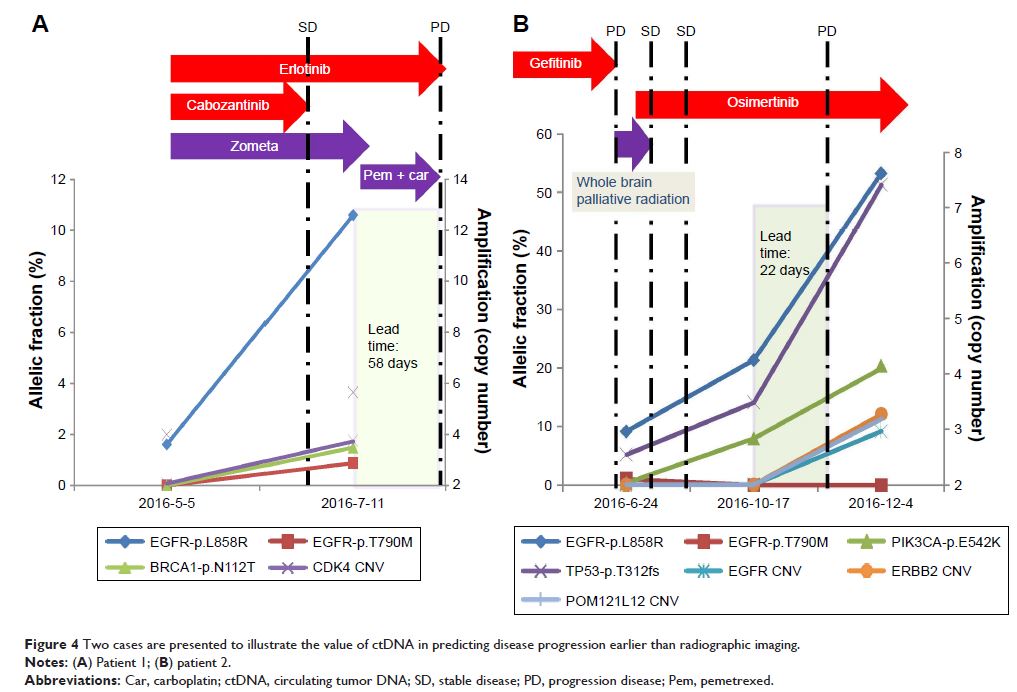9 0 6 7 6
论文已发表
注册即可获取德孚的最新动态
IF 收录期刊
- 2.6 Breast Cancer (Dove Med Press)
- 3.9 Clin Epidemiol
- 3.3 Cancer Manag Res
- 3.9 Infect Drug Resist
- 3.6 Clin Interv Aging
- 4.8 Drug Des Dev Ther
- 2.8 Int J Chronic Obstr
- 8.0 Int J Nanomed
- 2.3 Int J Women's Health
- 3.2 Neuropsych Dis Treat
- 4.0 OncoTargets Ther
- 2.2 Patient Prefer Adher
- 2.8 Ther Clin Risk Manag
- 2.7 J Pain Res
- 3.3 Diabet Metab Synd Ob
- 4.3 Psychol Res Behav Ma
- 3.4 Nat Sci Sleep
- 1.9 Pharmgenomics Pers Med
- 3.5 Risk Manag Healthc Policy
- 4.5 J Inflamm Res
- 2.3 Int J Gen Med
- 4.1 J Hepatocell Carcinoma
- 3.2 J Asthma Allergy
- 2.3 Clin Cosmet Investig Dermatol
- 3.3 J Multidiscip Healthc

基于循环肿瘤 DNA 测序进行的中国晚期非小细胞肺癌患者的临床特点及预后分析
Authors Rao C, Nie L, Miao X, Xu Y, Li B, Zhang T
Received 19 October 2017
Accepted for publication 29 November 2017
Published 12 January 2018 Volume 2018:11 Pages 337—344
DOI https://doi.org/10.2147/OTT.S154589
Checked for plagiarism Yes
Review by Single-blind
Peer reviewer comments 2
Editor who approved publication: Dr Tohru Yamada
Purpose: Circulating tumor DNA
(ctDNA) is a noninvasive and real-time marker for tumor diagnosis, prognosis,
and prediction. However, further investigations about ctDNA prognostic and
predictive value are still needed, and conclusions from several studies were
inconsistent.
Experimental design: We performed capture-based targeted ultradeep
sequencing on liquid biopsies from a cohort of 34 advanced Chinese non-small-cell
lung cancer (NSCLC) patients and analyzed the clinical use of ctDNA in this
study.
Results: On the basis of clinical characteristics of the 34
NSCLC patients, we found that brain metastasis correlated with shorter
progression-free survival (PFS) and is more prone to happen in younger
patients. After ctDNA sequencing, we analyzed the prognostic value of baseline
ctDNA. In osimertinib-treated group, high max allelic fraction (maxAF)
correlated with shorter PFS. But for the cohort of 34 patients, no correlation
can be observed between maxAF and PFS. We also presented two cases to
demonstrate the value of disease progression prediction by ctDNA, which can be
detected earlier than clinical response.
Conclusion: In this study, we demonstrated that ctDNA is a
prognostic marker for evaluating treatment response and predicting recurrence
in advanced NSCLC. Further investigations with larger cohort and uniformed
patient background are still needed to validate our findings.
Keywords: circulating
tumor DNA, non-small-cell lung cancer, prognosis
